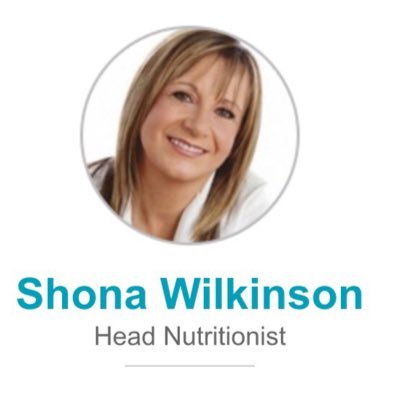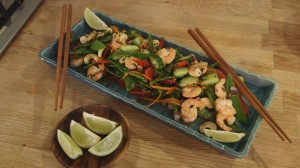Millions of us are cutting out different foods and ingredients from our diets, without any medical guidance to do so.

Shona Wilkinson
That’s according to new research released today which shows that almost one in ten have eliminated dairy from their diet – half of those based on their own self-diagnosis, slightly less wheat – more than 40% having self-diaganosed an intolerance, and a similar number gluten – with half of those having made the decision based on their own knowledge.
Furthermore, following the war on sugar in the last two years, one in five of us have eliminated it from our diets, while one in six have ditched fat.
The study by Nutricentre also asked respondents what other measures they have taken to improve their health and or lose weight in the last two years, with a third having tried eating smaller portions, one in six skipping meals and a similar number skipping breakfast.
More than one in 20 have gone on a juice diet, while slightly less have tried weight management classes and soup diets, with some having gone vegetarian and some vegan.
But do these measures actually work? And what do you need to know if you are set on cutting out certain foods in 2016?
Recent research suggests:-
• As many of us continue on with our new year health kicks, a new study released today looks at the trend for eliminating food groups from our diets as a fix-all solution to weight and health issues
• Almost one out of ten say they have cut out dairy in the last two years, with similar numbers having eliminated gluten and wheat
• More than 40% who have eliminated those food groups have done so after self-diagnosis
• With the war on sugar one of the biggest health stories of the last year, it’s no surprise that more than a fifth have cut out sugar, while one in six have got rid of fat in their diet
• But could the trend for cutting things from our diet without medical advice to do so, be unnecessary?
So Patient Talk interviewed Shona Wilkinson, a leading nutritionist, to get the facts straight!
PatientTalk.Org – What are the common food groups being eliminated and why? And is the overall effect a positive one?
Shona Wilkinson- Nutricentre has done a study on over 2000 people, and we’ve actually seen that about 1 in 10 people are cutting out a common food group. These seem to really be wheat, dairy, fat, and sugar, as the predominant ones. So sometimes this can be necessary, and sometimes it can’t. So we just have to be a bit careful if were cutting out whole food groups from our diet, to make sure that were not cutting out nutrient groups as well.
PatientTalk.Org- Is it really possible to cut out fat and sugar from a diet given basic chemistry?
Shona Wilkinson- Probably not. And I don’t know quite why you’d want to cut them totally out of your diet. Why would you want to cut out fat from your diet? This was a message that was going around in the 70s and still seems to be hanging on out there at the moment, so no we don’t want to cut fat out of our diet. Sugar, yes it’s not great for us, but again we don’t want to cut it totally out of our diet. And as soon as you cut something out of your diet, the one thing you can guarantee is that you have real cravings for it, so don’t cut it totally out of your diet, we’re talking about reducing it.
PatientTalk.Org- And how much of it is intolerance related?
Shona Wilkinson -As far as the wheat and dairy is concerned, quite a lot of it. So talking about wheat, quite often people when they have wheat in their diet it can give them digestive problems, so it could be cramping, it could be diahrrea, it could be constipation, quite often a lot of bloating as well. So that can be an intolerance. As far as dairy is concerned, common side effects of having dairy are usually kind of mucus related, a blocked nose, blocked air passages, that kind of thing.
PatientTalk.Org- Okay. What is the difference between an allergy and intolerance?
Shona Wilkinson- There’s a big difference between an allergy and an intolerance, so an example would be, being a celiac. A celiac is someone who has got an auto immune disease and cannot have gluten in their diet. So that’s an actual allergy. The difference there would be someone who gets digestive problems after they’ve had gluten. So rather than it being very severe it could be just a bit of bloating. So they are very two distinct different things.
PatientTalk.Org – So in terms of severity, an allergy is a way more severe problem than an intolerance?
Shona Wilkinson- Absolutely and it can in some cases be life threatening.
PatientTalk.Org – Why has gluten intolerance increased in the last few years?
Shona Wilkinson- Yes gluten intolerance has seemed to increase in the last few years and there’s two schools of thought about this. Partly because one reason could be its quite trendy at the moment to follow a gluten free diet. The other reason is purely the amount of gluten we have in our diets nowadays. So we may have toast or cereal for breakfast, followed by a sandwich or baguette or some sort for lunch, followed by a pasta meal in the evening. That’s quite a common diet for a lot of people nowadays, and if you think about it that’s wheat, wheat, wheat for every single meal, and it’s just becoming too much for our bodies to deal with. So if you’re in that kind of situation, it’s just a matter of reducing your intake, or perhaps cutting out of your diet for 12 weeks and then slowly reintroducing it at a steady slow level and letting your body let you know what is the amount it can deal with every day.
PatientTalk.Org – What is the difference between celiac and gluten intolerance?
Shona Wilkinson – yes so celiac is an actual auto immune disease. It’s medically recognized and it can be life threatening. An intolerance is when you get slight digestive conditions after eating wheat containing food. So they are very different, one is a medical condition and one is more an intolerance that you just can’t cope with it as much.
PatientTalk.Org – What is a juice diet and how would it work?
Shona Wilkinson – Yeah, the juice diet again is quite trendy at the moment, especially it being January. Basically its people living for probably usually about 7 days, just purely on juices. We have to be very careful about this because it’s not really training you on how to eat healthily so by the end of your juice diet you can just go back to your normal unhealthy eating habits. But also with juices, they tend to be predominately fruit, which can be high sugar content. So not the healthiest of thing, not something a nutritionist usually recommends.
PatientTalk.Org- Is there much evidence of self-diagnosis? How is it done? What are the dangers, if any, associated with self-diagnosis?
Shona Wilkinson – Yes the study done by Nutricentre shows that 40% of people have eliminated food groups from their diet just on self-diagnosis. This is usually just by monitoring their symptoms, some people keep a food diary and monitor any symptoms they’ve got after they’ve eating a certain type of food. A lot of people reading things on the internet. There aren’t really any dangers of this unless you’re cutting out a food group and not getting the nutrients that you need. So for example if you become a vegan, then you have to be careful that you’re still getting the nutrients that you need there. Self-diagnosis can also be done through a blood test, which is quite an accurate way to see if you’ve got a food intolerance. There’s lots of other tests out there which I wouldn’t necessarily recommend, but a blood test is the most accurate.
PatientTalk.Org – Does this trend suggest a decrease in confidence in traditional health care providers?
Shona Wilkinson- I don’t think it does, I think it’s just that people are more health aware nowadays, and they have access to more information through the internet.
PatientTalk.Org- What common ways are used by empowered patients to improve their health?
Shona Wilkinson- Yes, I think people are now more aware of their health. They’re more aware of where to find out information. I think also people know that if you cook your food at home you know exactly what’s going into that food. Whereas if you buy a ready meal for example you can probably guarantee it’s got sugar and salt in it to begin with because that’s what our taste buds like. So I think the health empowered patient is knowing that they want to cook their food at home and be a bit more aware of exactly what they’re eating.
PatientTalk.Org- Finally what advice would you give to somebody who has just diagnosed themselves with an allergy or intolerance?
Shona Wilkinson – Yes I wouldn’t like to think that anyone is diagnosing themselves with an allergy that has to be done by a medical professional. If they think they have a food intolerance, try keeping a food diary and making sure that you do. And perhaps speak to a nutritionist to get some advice, the best way to deal with this.



